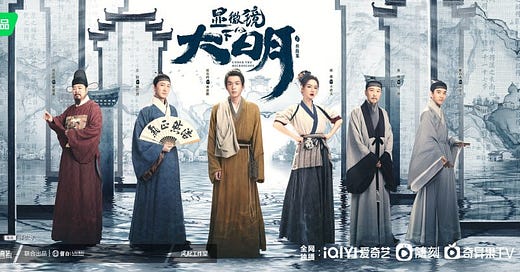Under the Microscope (2023)
Who doesn’t love an underdog triumph over the odds story? I don’t know how this gem almost eluded me but a show that features men with beards squabbling over the technicalities of the legal code is likely not to be everybody’s cup of tea. For me however this 14 episode series is a rare combination of smart, heartwarming, hilarious and just plain fun. It has me on the edge of my seat from start to finish. The courtroom drama (and there are a few) in the final two episodes of this is an exemplar of entertaining theatre.
Set during the waning days of the Ming dynasty, Zhang Ruoyun is the neurodivergent Shuai Jiamo who has a knack for figures. [In this regard I am reminded of the US tv show Numb3rs and the Japanese Galileo series) His obsession with the accuracy of his calculations especially in the distribution of land leads him and best friend Feng Baoyu (Fei Qiming) down a rabbit hole of bureaucratic mismanagement and corruption. The Central Plains is a large place. The country’s capital located some distance away relies heavily on diligent and even honest officials to ensure that the people are flourishing and everyone’s paying their fair share of taxes so that the world can go on spinning. All this assumes that officials picked from the country’s intelligentsia are worth their salt and are content to humbly “serve the country”. However when the cat’s not looking, the mice get up to mischief. There’s never enough money so they collude with the gentry to defraud the uneducated peasants and increase their pieces of the pie over time hiding behind layer upon layer of red tape with all kinds of mutually beneficial trade-offs.
Ultimately the war on corruption is not fought with weapons of steel. There are plenty of weapons showcased but the biggest one is likely to be red tape itself. It may be used as an impediment to truth. But in the right hands it is also the salvation of the show’s protagonists. Wielded by a knowledgeable soul with conscience, it can be a tool that holds back the forces of evil to great effect.
The tragedy though is that truth and justice is the last thing that matters to most in this fray. There are fascinating modern parallels here. No one really cares that 1+1=2. In fact 1+1=2 can become 1+1=3 at the whim of a corrupt educated class determined to push forward their own agendas on an unsuspecting populace. It’s akin to Winston Smith at the end of Orwell’s 1984. If the powers that be can make you state a lie as truth, it can make you do anything.
Shuai Jiamo is the outsider in a world of competing agendas. His neurodivergence deliberately sets him apart in multiple ways. He’s also suffering trauma from an event 20 years earlier that saw him orphaned. He is the age old oak tree that stands in the midst of the storm. Immoveable. Incorruptible. Individualistic. He challenges the status quo by his presence. He unwittingly becomes an icon against tyranny. The underdog standing against oppression. When all he cares about is that the numbers make sense. His role in the story is to bring to light all the man-made complexities caused by a web of self-interest. His simplicity is a bulwark against the complexity. Nonetheless he can’t do it alone. He needs his friend Feng Baoyu and frenemy lawyer Cheng Renqing (Wang Yang) to help him address a wrong that has implications beyond 1+1. It is a telling indictment not just of that world but ours that the truth matters very little but boils down to how one is able to prosecute one’s arguments in such a way as to negotiate trade-offs and mutual benefits.
Without saying, Zhang Ruoyun is terrific in this and he can be relied on to pick intelligent scripts. He too has a penchant for playing quirky characters. The presence of Wang Yang is usually also a guarantee of a quality production. The other faces in this are rock solid even the youngish Fei Qiming (not exactly his first outing) really comes into his own in those last two episodes. Others will recognize Wu Gang who also co-starred with Zhang Ruoyun in Joy of Life and Zhang Fan who seems to be in every other project that I watch.
The production values are great apart from the usual obvious editing misdemeanours. It's a testament to the quality of the direction that a show that's based on palace politics and bureaucratic red tape can be as enjoyable as this. The series is based on a real life case written up by the well-regarded novelist responsible for Luoyang and The Secret of the Three Kingdoms, Ma Boyong.




